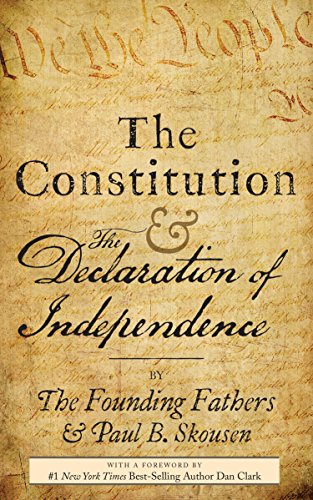Front Matter for the Paul Skousen Pocket Constitution
Note that the authors are given as The Founding Fathers, and Paul B. Skousen! Misunderstandings about the Constitution1. Myth: The Constitution is Old FashionedResponse: Protecting unalienable rights won't grow old. We all wonder — is it "old fashioned"? If so, the next question must be, "which part?" The Constitution controls the political powers that protect our rights. Changing those privileges and constraints exposes our rights to political abuse and eventual destruction. 2. Myth: It's a Living Document; It Must Change Response: We all wonder - shouldn't it "change with the times"? The power of the Constitution to protect human rights never depended on our culture, economics, technology, or world affairs. It stands apart to ensure that our rights do not succumb to the shifting priorities of passing generations. So long as the people want their human rights protected, the Constitution must remain an uncompromising, unchanging defender against all challengers. 3. Myth: Executive Orders Are the Law Response: The number of Executive Orders doesn't matter, but their content does. Presidents using them to make new laws defy the proper and lawful role of Congress. 4. Myth: It's a Complicated Document Response: The Constitution was written so that all Americans could understand it. Spending time to read and study it will bring increased insight into how all Americans may better unite to strengthen and support each other. 5. Myth: Disruption is Protected Free Speech Response: The First Amendment protects a speaker's right to speak and the listeners' right to listen. Hecklers who shout down speakers or disrupt proceedings illegally violate the rights of everyone present who came to both speak and to be spoken to. 6. Myth: Supreme Court Interprets the Constitution Response: The actual text of the Constitution is the "supreme Law of the Land." The Court is not authorized to interpret or use prior interpretations to resolve legal issues. The Justices are supposed to apply original intent and meaning, not interpret to achieve different meanings. Thomas Jefferson saw that abuse coming and warned there should have been a check and balance placed on the Court. 7. Myth: Prayer Was Legally Banned from Schools Response: Originally the States were empowered to set their own rules on religion, not Congress. In 1962 the Supreme Court transformed that state role into a federal role by banning prayer and Bible study in all public schools. 8. Myth: The Bill of Rights Lists Our Human Rights Response: Every human right existed before the Constitution. The Bill of Rights is not an exhaustive list of all rights but does list several specific human rights the government may not abuse or abolish. 9. Myth: It's a Hodgepodge of Compromises Response: There were only three main compromises: Slavery would continue for 20 years if the South would join the union; the federal government could regulate interstate trade; and representation would include Representatives based on population, and two Senators per state. All other issues were debated and passed by majority vote. 10. Myth: Federal Government Controls the States Response: The States must obey every Congressional law that does not violate the Constitution. If a new law is unconstitutional the States are free to disregard it without waiting on the Supreme Court's examination. ForewordThe Four PrinciplesThe Declaration's two introductory paragraphs show how it is anchored in the rock of four unalienable principles necessary for freedom anywhere in the world:
Divine Influence on the ConstitutionJefferson's early draft of the Declaration used the wordderived. Benjamin Franklin and John Adams replaced that with the phrase endowed by their Creator, which meant the Declaration rested upon rights as God had given them, not as man understood them to be. Thus, America's Founders chose to establish the new nation upon the laws of God, not upon the natural laws of man. Later, Congress inserted the adjective certain in the place of Jefferson's inherent, which Noah Webster in 1828 described to mean existing in something else, so as to be inseparable from it. The word was appropriate if man was certain about the existence of the rights being relied upon, but uncertain of their exact content. This meant that once God was identified as the giver of those rights, then the word certain became appropriate, because... (this is all that was scanned and given to me — jm) Read reviews on Amazon... [AMAZON]. |